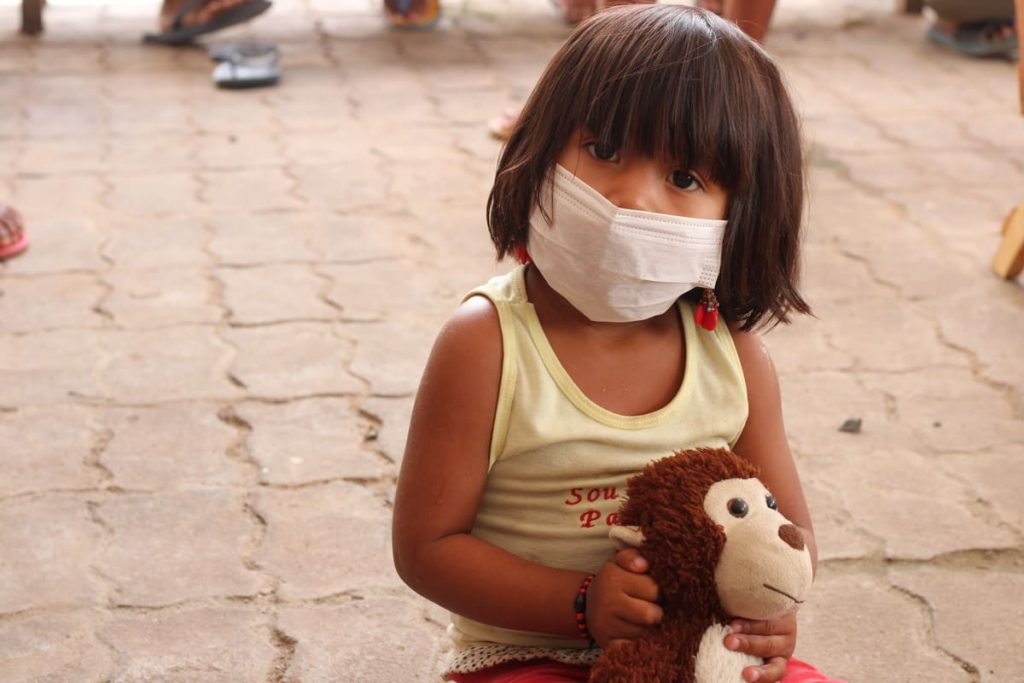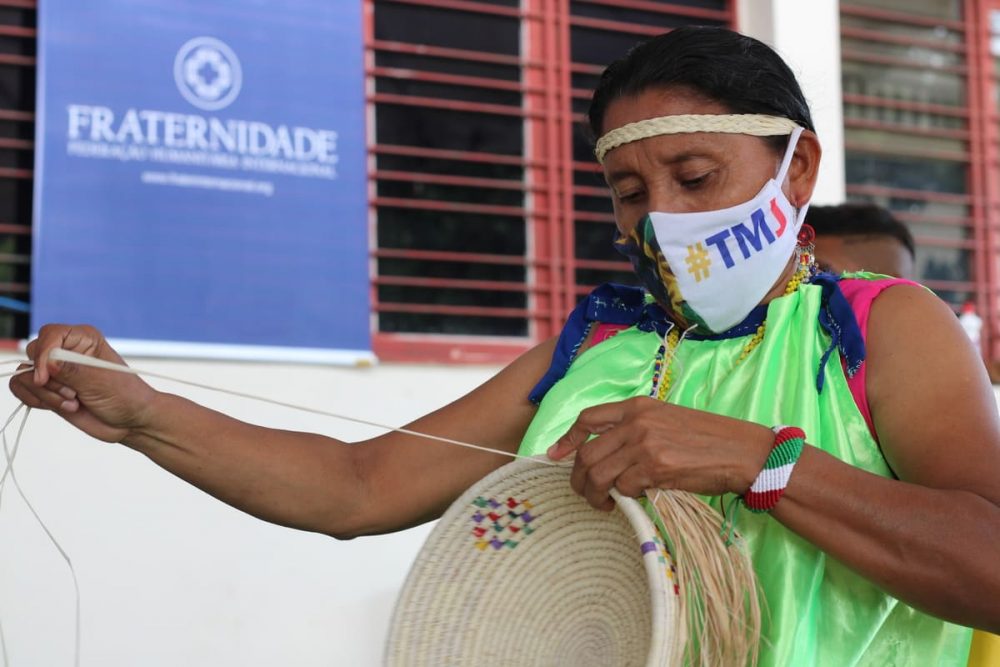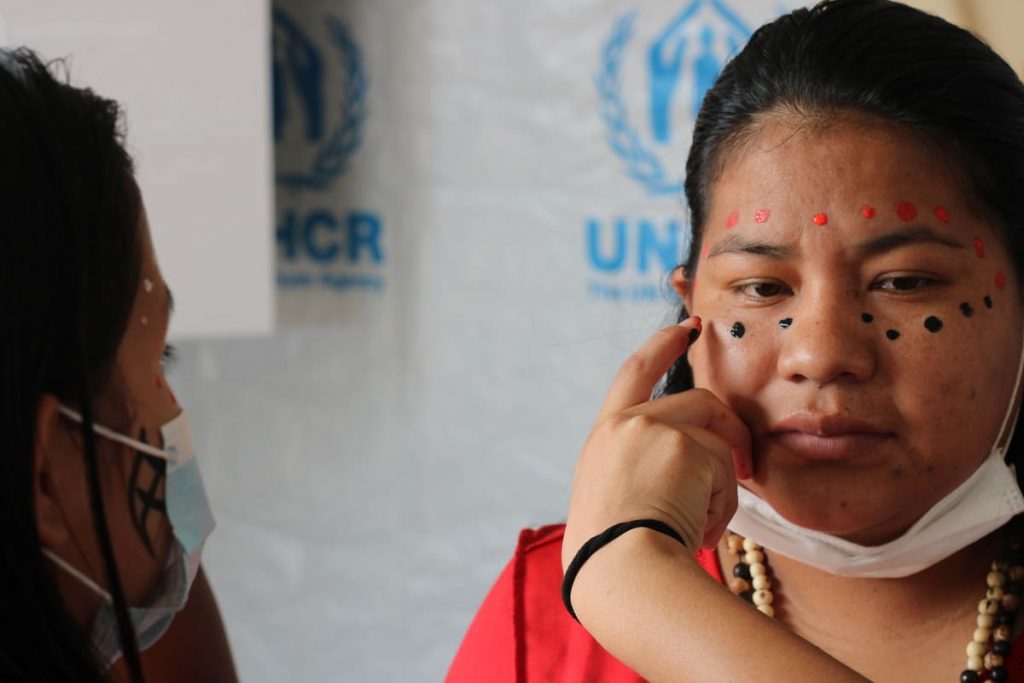A space for Venezuelan indigenous immigrants and refugees
The official inauguration ceremony of the Indigenous Cultural and Training Center, located in Boa Vista, Roraima, took place on May 6. The space, conceived of by the Fraternity – International Humanitarian Federation (FIHF), is the result of a partnership between this institution, the United Nations High Commissioner for Refugees (UNHCR), and Operation Welcome, the humanitarian taskforce coordinated by the Brazilian Federal Government through the Armed Forces.
The Indigenous Cultural and Training Center (ICTC) was created to develop cultural, teaching, and professional training activities for Venezuelan natives who live in humanitarian shelters in Roraima as immigrants and refugees. The administration of the Center is the responsibility of the Humanitarian Fraternity (FIHF), that since 2016 has been active in the humanitarian response to this population, and also manages the five indigenous shelters in the State.
Lasting Solutions
In light of the large flow of Venezuelan immigrants and refugees into the northern region of Brazil, and the grave humanitarian crisis that is continuing, the project of the ICTC emerged as a response to the need for creating specific lasting solutions for the question of the indigenous immigration. Up until now, and because of the laws that protect the dissemination of the Brazilian indigenous peoples, they have not had access to the Interiorization Program of Operation Welcome. Through this program, immigrants and refugees are voluntarily transferred to other regions of Brazil so as to have a better chance at socioeconomic insertion.
Within this context, the indigenous population is restricted to receiving assistance in humanitarian aid in the existing shelters specifically dedicated to this population, without the possibility of developing an activity that could bring them autonomy and allow them to be a protagonist in their own destiny; or even, as an alternative, to immigrate to other regions of Brazil with their own resources, most of the time coming from the selling of handicrafts or street begging.
To reverse this rather disheartening situation, in the ICTC, the intent is to offer a space for their cultural manifestations, which include the different ethnic expressions, and for meetings and gatherings where they can socialize to discuss their realities and aspirations, strengthen their culture, and open up possibilities for the future. In the area of Education, the focus will be on young people and adults, with the work of digital inclusion through computer courses, with literacy for those who want to explore the world of letters, and Portuguese courses for foreigners, since the language is one of the main barriers to their entry into the Brazilian labor market. Many don’t even speak Spanish, because their mother tongue is of the indigenous ethnicity to which they belong.
On a more specialized front, professional courses will be promoted that will enable the development of their potential and capabilities, that provide new knowledge, that stimulate entrepreneurship, cooperatives and associations, and which through certification, will contribute to the enrichment of their curricula, qualifying them for the labor market and thus providing social emancipation and income generation.
Besides offering local courses, the ICTC will also function as a center of facilitation in the active search for teaching programs for young people and adults, and for opportunities for free outside training, which may contribute to the purpose of professional qualifications for Venezuelan indigenous people, as well as for their empowerment in relation to social and working rights. In this sense, it will work toward the establishment of local partnerships with civil society entities and institutions, which is already successfully taking place in the work of the Lasting Solutions Sector of the Humanitarian Fraternity (FIHF), the sector more directly responsible for the management of the space.
It is also worth mentioning a fundamental characteristic of the work of the Center, and more comprehensively about all the work of the Humanitarian Fraternity (FIHF): everything will be offered free of charge to the beneficiaries, through the labor of the volunteers of the institution: in this case specifically, the project is implemented with resources from the UNHCR, with the infrastructure donated by Operation Welcome and through the partnerships with other institutions that are also committed to the humanitarian cause, or even to the social cause.

Activities that are already taking place in the space
Some activities are already at full steam in the space of the Center as a result of the work of the Lasting Solutions Sector. For example, there is already a course on computer science for young people, in partnership with the Virtual University of Roraima (UNIVIRR), using the computer room that was assembled with computers donated by the Industries Federation of São Paulo (FIESP). The monitor of this course is one of the beneficiaries of the shelters, of the Warao tribe, who participated in the first computer course done in the Pintolândia Shelter last year.
Also taking place at the same time are Cutting and Sewing, Shoe Making and Audiovisual Production workshops. In addition, the space hosts the meetings of the Indigenous Leadership School, promoted by the Insikiran Institute of the Federal University of Roraima (UFRR), and the preparatory classes for those who applied to Encceja.

The space also serves as a base of work for the translators of the Warao and E’ñepa tribes, hired by the Humanitarian Fraternity (FIHF) from among the sheltered population, to facilitate communication with the beneficiaries and make important materials on health and documentation accessible to them in their mother tongues.
All the Venezuelan indigenous ethnicities that immigrated to Brazil were represented in the inauguration of the ICTC
In a natural but also symbolic way, the Art-Education Sector of the Humanitarian Fraternity (FIHF) prepared a musical festival with the presence of representatives of all the Venezuelan ethnicities that immigrated to Brazil, and who live in the humanitarian shelters under the management of the institution. Represented were the peoples of the Kariña, E’ñepa, Akawaio, Taurepang and Warao.
The joining of forces in support of a common objective is a mark of any group musical production. In this case, the joining of forces in support of a common objective goes a little beyond the music, and carries the imagination into an ideal of harmonic integration among human beings, in spite of their cultural differences. The artistic presentation not only opened the inauguration ceremony of the ICTC, but also opened the way for the building of a world of plurality, equality and peace by all and for all.


























